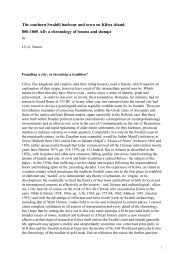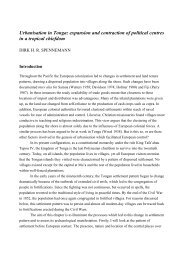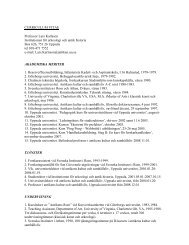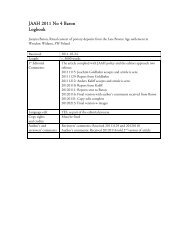Beowulf - Institutionen för arkeologi och antik historia
Beowulf - Institutionen för arkeologi och antik historia
Beowulf - Institutionen för arkeologi och antik historia
You also want an ePaper? Increase the reach of your titles
YUMPU automatically turns print PDFs into web optimized ePapers that Google loves.
174<br />
Then Ælfwine said, he talked boldly:<br />
Do you remember the speeches which we often spoke at the mead,<br />
when on the bench we made up boast,<br />
Heroes in the hall, about bold fighting:<br />
Now may it be tested who is brave (Maldon vv. 211–215).<br />
When <strong>Beowulf</strong> is about to fight Grendel in the hall, i.e., the episode framed by vv.<br />
675–956, he effectively pulls himself together by recollecting his speech in the hall.<br />
As an aristocrat he uses the hall to clarify his aristocratic mind, self and society. In this<br />
interaction with his own past he does not reconsider his speech or have second<br />
thoughts about fighting Grendel’s mother. The reflection of <strong>Beowulf</strong>ian homily in the<br />
conversation among tablemates was no doubt often the pompously declared promises<br />
hinted at in Maldon. Such promises express loyalty to the high ideals of the hall,<br />
but as their natural complement we may also expect collusion and innuendo<br />
(Goffman 1981, p. 134) by means of which hall-guests comment upon the talk from<br />
the upper part of the hall in which the guests in the lower part of the hall participated<br />
as hearers. Examples of this can be found in <strong>Beowulf</strong> when the tale about the fight at<br />
Finnsburg, a great, but cruel victory for the Danes, is told in Hroðgar’s hall. The men<br />
in the hall cheer in delight when the scop tells the saga (vv. 1066–1162). This is a sign<br />
of appropriate behaviour, but it also shows us that the possibilities for the men to<br />
engage themselves in penetrating discussions are limited and nobody can take the<br />
floor in the lower part of the hall.<br />
Owing to the construction of the hall and the way the guests are seated, their<br />
comments, if critical, can hardly engage more than a few persons and they are under<br />
observation. In the very end of <strong>Beowulf</strong> (Part I) we are given to understand that<br />
people are observed and judged by their behaviour in the hall (vv. 2178 ff.; cf. above<br />
p. 89) when the Lord of the Weather-Geats does not accord the young <strong>Beowulf</strong> a<br />
place of honour on the meadbench because the young man is slow and feeble. Viga-<br />
Glum in Vigfus’ hall is given an inferior seat as a result of his being judged and obviously<br />
considered a bore in a hall (Viga-Glums saga, 6; translation Hollander 1972).<br />
This should convince us that enthusiastic consent and solemn man-to-man vows<br />
were the expected behaviour in the lower part of the hall. Furthermore, the wouldbe-wise<br />
character of the poems, Latin as well as Anglo-Saxon, Aud’s homily and<br />
Skalagrim’s verse tell us that the need to educate the hall-guests and inspire loyalty<br />
was deeply felt.<br />
The tension between the loyal, cheering collective and the possibilities of practising<br />
collusion and innuendo on a man-to-man level worked like a filter for those<br />
seeking a better position in the hall. Obviously one should neither be too critical nor<br />
too enthusiastic, since the message from the upper part of the hall is not always one<br />
and the same. In the situation when the story about the fight at Finnsburg is being<br />
told, this obvious opportunity for the men to applaud the raw slaughter of Jutes and








